- Home
- Marie Ferrarella
Cavanaugh or Death Page 11
Cavanaugh or Death Read online
Page 11
Montgomery’s brow furrowed. “I thought that was already taken care of.”
She’d assumed that since the man hadn’t been around previously, he hadn’t been filled in about the first grave. That was a detail she’d intended to fill in later, once they investigated the second grave.
“Then you know,” she concluded.
Montgomery allowed just a hint of a smug look to infiltrate his expression—as well as his tone. “I might play golf more than the average sane man, but not much escapes me when it comes to what goes on here at St. Joseph’s.” He gave a cursory glance through the rear window, which looked out on the cemetery proper. “Mr. Weaver informed me that the grave of one of our ‘occupants’ as you so amusingly put it was exhumed and that nothing out of the ordinary was found. Has anything changed since then?” Montgomery challenged.
“Possibly,” Moira hedged. “This is another grave that’s been disturbed.”
“Two graves have been disturbed?” Montgomery asked, looking both skeptical and just the slightest bit concerned.
“That we know of,” Moira interjected. “There very well might be more that we don’t know about.”
Montgomery didn’t seem to be buying into her theory. “Why would anyone be disturbing graves here?” he asked.
“That’s what we’re trying to find out,” Davis replied evenly, answering the man’s question before Moira could attempt to.
The two men exchanged looks. Moira had the distinct impression that she was witnessing two elks sizing each other up before doing battle over territory.
“Yes, of course,” Montgomery finally said. “Anything I can do to help. Which grave is it?” he asked, turning on his computer.
Making himself comfortable, he waited to type the name in.
Moira gave him as succinct a description as possible of the area, followed by the name on the headstone and the date that the woman had been laid to rest.
“That’s before my time,” Montgomery told her when he heard the date.
“The Valli family owned St. Joseph’s back then. I think their nephew ran the place for them. But they left all the files when they sold the place,” Montgomery explained as he conducted a search through the computer’s database. “Ah, here it is,” he declared triumphantly. “Marjorie Owens. It says here that her daughter, Janice, was the one who made the arrangements. I’ve got an address,” he offered, looking further through the file. The next moment he hit the print key and the printer behind him came to life. “But after all this time, who’s to say that the daughter is still there? Or anywhere,” he added significantly, handing her the printout.
Given that the burial had taken place twenty years ago, the man could have a point, Moira thought. She made no comment on his speculation.
“Thank you, you’ve been very helpful,” Moira said, folding the piece of paper with the woman’s last-known address. She tucked the paper—after looking at it—into her pocket.
Pushing back his swivel chair, Montgomery turned it in her direction then stood. “Anything else I can help you with, Detective?” he asked attentively, his eyes sweeping over her.
“We’ll let you know,” Davis told him, positioning himself so that he was between Moira and the man who ran the cemetery. He looked at Moira. “We’ve got to go,” he told her.
They did, but she wasn’t exactly thrilled that Gilroy had suddenly taken the lead. But because she had to work with the man, Moira bit her tongue and hadn’t contradicted the detective in front of the cemetery director. Instead she’d thanked Montgomery again for his help and promised they would be in touch “soon.”
However, once they were outside, heading toward Gilroy’s car, she looked at the detective and said, “That was kind of rude, don’t you think?”
Gilroy’s response was bordering on indifferent. “He was hitting on you.”
Moira rolled her eyes. “You never mentioned that you had a vivid imagination.”
“I thought you women were supposed to have some kind of radar when it came to that kind of thing.”
“We do,” she replied. “Which is why I know he wasn’t hitting on me. If anything, he was just harmlessly flirting.”
Davis blew out a breath as he released the security lock on his vehicle. He had no patience with semantics. “Sorry, I’m not up on the finer points. I just know that slimy is slimy.”
She was about to contradict him but instead she flashed a grin. “Why, Detective Gilroy, are you being protective?”
“Just get in the car,” he growled.
Moira made no move to do anything of the kind. “Please get in the car,” she corrected and waited expectantly.
Davis looked as if he was going to spit fire. But, after a couple of minutes had gone by framed in icy silence, he finally repeated the line she had fed him and ground out, “Please get in the car.”
“Much better,” Moira told him with approval.
Then, opening the car door on the passenger side, Moira slid into the unmarked vehicle. As she reached for her seat belt, she glanced down at her hand. There was dust on it where she had touched the door.
“Ever consider taking this car through a car wash?” she asked.
“There’s a drought on,” Davis reminded her tersely, glad for the change in subject but none too happy about having any sort of shortcomings pointed out, no matter how accurate she was being or how trivial the shortcoming might be.
“Birdbath, then,” she amended whimsically.
“Don’t we have more important things to concentrate on than the cleanliness of my car?” Gilroy asked.
“You’re absolutely right,” she agreed. “We have more important things to focus on than dirty cars or slimy cemetery directors.”
Davis glared at her as he pulled out onto the street then relented. He was beginning to learn that engaging in verbal warfare with this woman was an exercise in futility.
“Where to now?”
He expected her to say back to the precinct and was caught off guard when Moira responded, “How about grabbing some late lunch while I call my sister, the computer wizard, to see if she can verify that this is Marjorie Owens’s daughter’s current address.”
“You’re the primary.”
“Yes, we’ve already established that,” Moira said patiently. Getting direct answers out of this man was definitely an exercise in patience. “Does that mean you don’t care if we eat or not, or are you hungry and just don’t want to admit to experiencing something as human as hunger?”
He shrugged again, his wide shoulders moving rhythmically in their indifference. “If you’re hungry, I could eat.”
Moira sighed. He actually challenged her patience even more than her brothers did. They’d probably love him, she concluded.
“Someday, Gilroy, you’re going to have to practice giving straight answers to straight questions. You do realize that, don’t you?”
“‘Someday’ is far from today,” he answered her. “I wouldn’t concern myself about it if I were you.”
She knew he was telling her that they weren’t going to be working together long enough to be facing a “someday” in their future.
“You mean I’m not growing on you?” she asked innocently.
He glanced at her for less than half a second. “You mean like fungus?” he countered.
Moira bit back a long sigh, dropping the subject. “Do you have anything against Hamburgers and Heaven?” she asked, referring to a semi-fast-food restaurant located in the general vicinity.
His tone gave nothing away one way or another. “Nope.”
“And with the resounding endorsement, we’re off to Hamburgers and Heaven.” Since he was driving, she gave him the general directions. “It’s located on Yale and Aurora Center Drive.”
“I know where it’s locate
d, Cavanaugh,” he told her, never taking his eyes off the road.
Since the place was not the hub of criminal activity, there was only one reason for his being familiar with the restaurant.
“Do you eat there often?” she asked him.
Davis didn’t bother to think his answer over. It was automatic and almost robot-like. “Once or twice.”
Since his answer was so bland and emotionless, he wasn’t prepared for the woman’s pleased expression or for the words that followed.
“This is good.”
“‘This’?” he questioned.
Moira gestured toward him and then to herself. “What we’re having here. This back-and-forth thing,” she said, gesturing again. “In case it escaped your notice, it’s called having a conversation.”
The look he spared her said he thought she was crazy.
“If you say so,” was all that Davis allowed himself to say.
Moira smiled to herself.
Sometime in the past ninety minutes she had decided not only to get to the bottom of whatever odd thing was happening at the cemetery, but also to get her tall, dark and silent partner to become a card-carrying member of the human race again.
Even if it killed her—and possibly him.
* * *
“You do know that I have other work to do,” Valri asked her when she’d placed a call to her sister while she and Gilroy were waiting in the restaurant for their orders to be filled. “Real work. Official work,” Valri specified.
“This is official work, Valri,” Moira protested. Because she caught Gilroy looking at her quizzically, she turned her back to him and lowered her voice, wanting to get this ironed out before she said anything to her temporary partner.
“Just not my official work,” Valri pointed out needlessly.
“I can’t help it if I’m not a computer expert,” Moira protested. “Some of us weren’t born with an ongoing Wi-Fi signal coming in.”
“It’s called opening up a basic computer programming book and doing a little studying on your own,” her sister pointed out.
“Say what?” Moira deliberately made a high-pitched noise that could have passed for static in her cell phone. “Sorry, Val, you’re breaking up. I’ll try to get you later.”
With that, Moira terminated the call. Turning back in his direction, she saw Gilroy looking at her skeptically. Although she would have happily ignored him, she knew she couldn’t.
“What?” she asked impatiently.
“Your signal’s not breaking up.”
Technically, he didn’t know if it actually was or not, but given that this was Cavanaugh, he definitely had his suspicions that she had just made the excuse up for some reason. Probably because she’d been backed into a corner.
Moira didn’t bother denying it. “I know that. Val knows that, too. But it’s better than just hanging up on her outright.”
She saw one of the servers come out from behind the counter, a tray with a number displayed on it in her hands.
The young woman announced, “Number thirty-three,” as she looked around the immediate area for someone to raise their hand.
“That’s us,” Moira said, rising to her feet from the booth.
She was surprised when Gilroy put his hand on her arm as if to hold her in place. Without saying anything to her, he rose and went to take the tray from the young girl.
Although on a tray, the food they had ordered was bagged rather than plated.
“Want to eat inside or out?” he asked Moira when he returned with the tray.
Rather than answer, she flashed him yet another wide smile.
“You pick,” she told him.
She was trying very hard to turn this into a decent working relationship. Gatherings at Andrew’s house were always filled with stories about how deep working relationships ran. She always listened on with envy. So far, she’d never experienced that sort of satisfying sensation herself.
“I’m not sure if I’m up to making such a major decision,” he responded sarcastically.
Well, she’d tried, Moira thought. “Fine, inside,” she said, choosing for him.
Mildly curious, he asked, “Why?”
She looked at him. Gilroy was joking, wasn’t he? “I didn’t realize I had to offer a rebuttal with my choice.”
“Doesn’t matter to me one way or another,” he told her. “I was just trying for that ‘conversation’ thing you’re so hot about,” he told her as he followed her to the table she’d selected.
“Sorry, didn’t realize you were actually making an effort. My bad. Okay... I said in here because this way we don’t mess up the interior of your car.” Then, in response to his skeptical look, she told him, “After all, your vehicle’s already dirty on the outside, I didn’t want to make a matching set of it by possibly dirtying the inside.”
He regarded her thoughtfully for a moment. “You put this much thought into everything?” Davis asked as he set the tray down.
Placing both bags of food as well as the soft drinks on the table, he deposited the tray off to the side.
Moira flashed him another one of her wide smiles. Instead of growing accustomed to it, the way he would have thought, he found himself responding to it in ways he didn’t welcome.
“I’m very deep,” she told him.
He laughed shortly. “That’s one description for it,” Gilroy muttered.
“Oh? And how would you describe it?” she asked, curious.
He didn’t have to stop to think. “The word I’d use is opinionated.”
Savoring a French fry, she shrugged at his answer. “All that means is that I have an opinion about most things.”
He restrained himself from laughing at her answer. “How about having an opinion on everything?”
“It’s better than being wishy-washy,” she pointed out.
“Well, I can’t argue about that,” he responded.
Moira laughed in response as she bit down on another large, thick French fry.
“Sure you can,” she assured him.
Davis decided that it was safer all around for both of them if he just didn’t respond.
Chapter 12
Moira and Davis were almost finished with their meals when her phone began to vibrate, letting her know that she had a call coming in.
She wiped her fingers on one of the extra napkins on the tray and then pulled out her phone. Pressing the accept button, she said, “Cavanaugh.”
“You’re out of luck, big sister,” Valri told her, getting to the heart of her call. “Janice Owens died two years ago. I couldn’t find any other next of kin listed anywhere so that lady in the cemetery has no one to put flowers on her grave.”
Neither did the first person—also a woman—that they’d wound up exhuming, Moira thought, wondering if that was just a simple coincidence or if it was something that tied the two incidents together.
In either case, Valri had done her job. “Thanks, Val, I owe you.”
“At this point, you owe me quite a lot,” Valri pointed out, amused.
She knew that Valri was kidding, but all the same, Moira did mean to pay her sister back somehow. “I’m good for it.”
“Yeah, yeah.” Valri laughed. “That’s what they all say.”
“You know, that fiancé of yours is having a very bad effect on you,” Moira deadpanned and then said, “Talk to you later, kid,” before terminating the call.
Having only half a conversation to work with, Davis had put his own interpretation to what he had picked up. “Bad news?”
That depended on whether or not you were Marjorie Owens, Moira mused, thinking of her sister’s reference to the fact that there was no one left to put flowers on the deceased woman’s grave.
“Yes and
no.”
“Are you going to make me guess or do I get to pick which it is?” Davis asked.
Mentioning the sad fact that Marjorie had no one to put flowers on her grave wouldn’t mean anything to Gilroy, she thought, so she merely summed up what Valri had told her.
“There’s no next of kin for Marjorie Owens. Her daughter died a couple of years ago. That means we’re going to need to get another court order to exhume the body.”
“Which you will pull out of your hat,” Davis declared with more than a touch of sarcasm.
“It’s not quite that simple,” Moira pointed out to him.
“It’s not quite that hard from what I saw the last time,” he reminded her. “Do I get to watch this court order materialize again?” he asked. “Or do I get to cool my heels in the car?”
She would have thought that once was enough for him. The man was full of surprises. “Do you want to come along?”
His shrug was just this side of indifferent in her opinion. “Might as well.”
Moira laughed drily. “You really should contain your enthusiasm.”
His eyes met hers. “You want enthusiasm, you should have teamed up with a cheerleader.”
The way he had phrased his comment was not lost on her. “Oh, so you admit we’re a team?”
He sighed like a man who knew he was going to have to remember to say even less than he usually did around this woman.
“I’m admitting nothing,” he answered, “except that somehow I got sucked into this and the sooner we find out what’s going on, the sooner I get back to my life.”
She couldn’t resist. He had all but fed her a straight line. “Because that life is so exciting.”
“Because it suits me,” Davis stressed. And there was no place in it for a woman who had the annoying habit of invading his thoughts and derailing them from the very straight, focused path they were on. Even if she did have a smile like sunshine. Sunshine was highly overrated.
Rising, he took the tray with its empty bags, napkins and what was left of their meals to the garbage container, upended the tray and then stacked it on top of the receptacle.

 Colton Baby Conspiracy (The Coltons 0f Mustang Valley Book 1)
Colton Baby Conspiracy (The Coltons 0f Mustang Valley Book 1) Cowboy's Rescue (Colton 911 Book 1)
Cowboy's Rescue (Colton 911 Book 1) Bridesmaid For Hire (Matchmaking Mamas Book 23)
Bridesmaid For Hire (Matchmaking Mamas Book 23) Secrets of Forever
Secrets of Forever Fortune's Greatest Risk (The Fortunes 0f Texas: Rambling Rose Book 4)
Fortune's Greatest Risk (The Fortunes 0f Texas: Rambling Rose Book 4) Cavanaugh Cowboy
Cavanaugh Cowboy Colton 911: Secret Defender
Colton 911: Secret Defender Cavanaugh Stakeout
Cavanaugh Stakeout The Late Bloomer's Road to Love
The Late Bloomer's Road to Love Colton 911--The Secret Network
Colton 911--The Secret Network An Unexpected Father
An Unexpected Father The Lawman's Romance Lesson (Forever, Tx. Series Book 20)
The Lawman's Romance Lesson (Forever, Tx. Series Book 20) Coming to a Crossroads
Coming to a Crossroads Colton 911: Cowboy's Rescue
Colton 911: Cowboy's Rescue Summer of Love
Summer of Love Cavanaugh Stakeout (Cavanaugh Justice Book 41)
Cavanaugh Stakeout (Cavanaugh Justice Book 41) Texan Seeks Fortune
Texan Seeks Fortune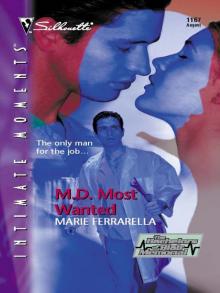 M.D. Most Wanted
M.D. Most Wanted Cavanaugh In Plain Sight (Cavanaugh Justice Book 42)
Cavanaugh In Plain Sight (Cavanaugh Justice Book 42) The Law and Ginny Marlow
The Law and Ginny Marlow Bridesmaid for Hire
Bridesmaid for Hire A Match for the Doctor
A Match for the Doctor The Sheriff’s Christmas Surprise
The Sheriff’s Christmas Surprise Colton's Secret Service
Colton's Secret Service A WEDDING FOR CHRISTMAS
A WEDDING FOR CHRISTMAS A Cavanaugh Christmas
A Cavanaugh Christmas Cavanaugh Fortune
Cavanaugh Fortune The 39-Year-Old Virgin
The 39-Year-Old Virgin Coming To A Crossroads (Matchmaking Mamas Book 24)
Coming To A Crossroads (Matchmaking Mamas Book 24) Cavanaugh's Missing Person
Cavanaugh's Missing Person Cavanaugh on Call
Cavanaugh on Call The M.D.'s Surprise Family
The M.D.'s Surprise Family Angus's Lost Lady
Angus's Lost Lady Her Red-Carpet Romance
Her Red-Carpet Romance Choices (A Woman's Life)
Choices (A Woman's Life) Prescription for Romance
Prescription for Romance A Perfectly Imperfect Match (Matchmaking Mamas)
A Perfectly Imperfect Match (Matchmaking Mamas)![[Kate's Boys 04] - Travis's Appeal Read online](http://i1.bookreadfree.com/i/03/21/kates_boys_04_-_traviss_appeal_preview.jpg) [Kate's Boys 04] - Travis's Appeal
[Kate's Boys 04] - Travis's Appeal Secret Agent Affair
Secret Agent Affair The Cowboy's Lesson in Love
The Cowboy's Lesson in Love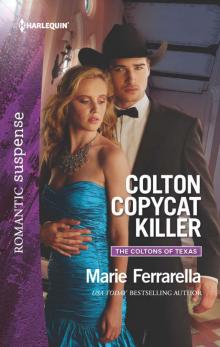 Colton Copycat Killer
Colton Copycat Killer A Small Fortune
A Small Fortune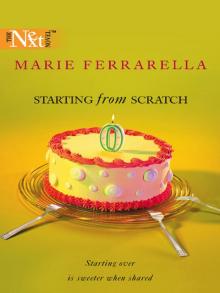 Starting from Scratch
Starting from Scratch Her Forever Cowboy
Her Forever Cowboy Colton Showdown
Colton Showdown Crime and Passion
Crime and Passion The Heart of a Ruler
The Heart of a Ruler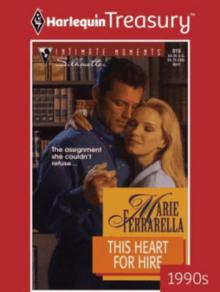 This Heart for Hire
This Heart for Hire A Forever Kind of Hero
A Forever Kind of Hero Special Agent's Perfect Cover
Special Agent's Perfect Cover The Baby Beneath the Mistletoe
The Baby Beneath the Mistletoe A Maverick and a Half
A Maverick and a Half The Doctor's Guardian
The Doctor's Guardian Cavanaugh Undercover
Cavanaugh Undercover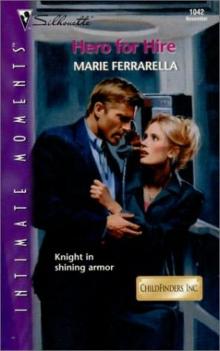 Hero for Hire
Hero for Hire Fortune's Heirs: Reunion
Fortune's Heirs: Reunion How to Seduce a Cavanaugh
How to Seduce a Cavanaugh The Heiress’s 2-Week Affair
The Heiress’s 2-Week Affair Twice a Hero, Always Her Man
Twice a Hero, Always Her Man My Spy
My Spy An Engagement for Two
An Engagement for Two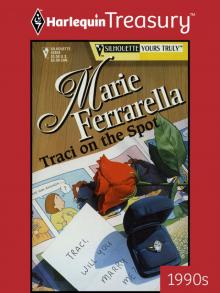 Traci On The Spot
Traci On The Spot Carrying His Secret
Carrying His Secret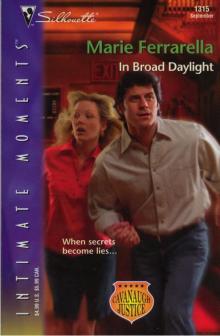 In Broad Daylight
In Broad Daylight Cavanaugh Cold Case
Cavanaugh Cold Case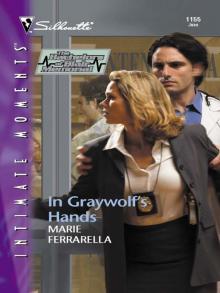 In Graywolf’s Hands
In Graywolf’s Hands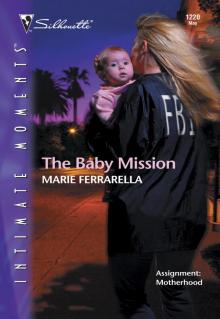 The Baby Mission
The Baby Mission Real Vintage Maverick
Real Vintage Maverick Twins on the Doorstep
Twins on the Doorstep Cowboys Are For Loving
Cowboys Are For Loving Heart of a Hero
Heart of a Hero The Cowboy's Christmas Surprise
The Cowboy's Christmas Surprise Cavanaugh’s Woman
Cavanaugh’s Woman Sundays Are for Murder
Sundays Are for Murder Mission: Cavanaugh Baby
Mission: Cavanaugh Baby Cavanaugh Strong
Cavanaugh Strong Wish Upon a Matchmaker
Wish Upon a Matchmaker Dangerous Games
Dangerous Games What the Single Dad Wants...
What the Single Dad Wants... Rough Around the Edges
Rough Around the Edges Cavanaugh Judgment
Cavanaugh Judgment Cavanaugh Watch
Cavanaugh Watch Cavanaugh's Secret Delivery
Cavanaugh's Secret Delivery The Pregnant Colton Bride
The Pregnant Colton Bride Let's Get Mommy Married
Let's Get Mommy Married Searching for Cate
Searching for Cate A Forever Christmas
A Forever Christmas Dangerous Disguise
Dangerous Disguise Mac’s Bedside Manner
Mac’s Bedside Manner Cavanaugh Pride
Cavanaugh Pride The Fortune Most Likely To...
The Fortune Most Likely To... Internal Affair
Internal Affair A Second Chance for the Single Dad
A Second Chance for the Single Dad The Cavanaugh Code
The Cavanaugh Code Sapphire and Shadow (A Woman's Life)
Sapphire and Shadow (A Woman's Life) Her Lawman on Call
Her Lawman on Call A Dad At Last
A Dad At Last Her Right-Hand Cowboy (Forever, Tx Series Book 21)
Her Right-Hand Cowboy (Forever, Tx Series Book 21) Cavanaugh Heat
Cavanaugh Heat![[Ladera by the Sea 01] - A Wedding for Christmas Read online](http://i1.bookreadfree.com/i1/03/27/ladera_by_the_sea_01_-_a_wedding_for_christmas_preview.jpg) [Ladera by the Sea 01] - A Wedding for Christmas
[Ladera by the Sea 01] - A Wedding for Christmas Lassoing the Deputy
Lassoing the Deputy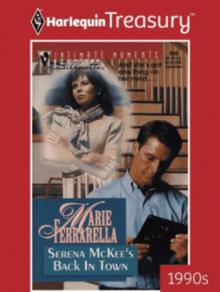 Serena Mckee's Back In Town
Serena Mckee's Back In Town A Baby on the Ranch: A Baby on the RanchRamona and the Renegade
A Baby on the Ranch: A Baby on the RanchRamona and the Renegade One Plus One Makes Marriage
One Plus One Makes Marriage Protecting His Witness
Protecting His Witness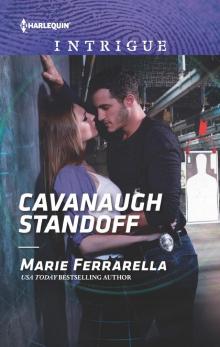 Cavanaugh Standoff
Cavanaugh Standoff The Baby Came C.O.D.
The Baby Came C.O.D. The Setup
The Setup Texas Rose
Texas Rose Three Marie Ferrarella Romances Box Set One
Three Marie Ferrarella Romances Box Set One The Lawman's Romance Lesson
The Lawman's Romance Lesson Desperately Seeking Twin...
Desperately Seeking Twin...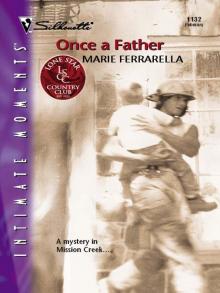 Once a Father
Once a Father![[The Sons of Lily Moreau 02] - Taming the Playboy Read online](http://i1.bookreadfree.com/i/03/25/the_sons_of_lily_moreau_02_-_taming_the_playboy_preview.jpg) [The Sons of Lily Moreau 02] - Taming the Playboy
[The Sons of Lily Moreau 02] - Taming the Playboy Lily and the Lawman
Lily and the Lawman Cavanaugh's Surrender
Cavanaugh's Surrender The Cowboy and the Lady
The Cowboy and the Lady Innkeeper's Daughter
Innkeeper's Daughter A Bachelor and a Baby
A Bachelor and a Baby![[The Sons of Lily Moreau 03] - Capturing the Millionaire Read online](http://i1.bookreadfree.com/i1/03/31/the_sons_of_lily_moreau_03_-_capturing_the_millionaire_preview.jpg) [The Sons of Lily Moreau 03] - Capturing the Millionaire
[The Sons of Lily Moreau 03] - Capturing the Millionaire Because a Husband Is Forever
Because a Husband Is Forever Diamond in the Rough
Diamond in the Rough The Doctor's Forever Family
The Doctor's Forever Family A Lawman for Christmas
A Lawman for Christmas Cavanaugh Rules: Cavanaugh RulesCavanaugh Reunion
Cavanaugh Rules: Cavanaugh RulesCavanaugh Reunion Baby Times Two
Baby Times Two![[The Sons of Lily Moreau 01] - Remodeling the Bachelor Read online](http://i1.bookreadfree.com/i1/04/02/the_sons_of_lily_moreau_01_-_remodeling_the_bachelor_preview.jpg) [The Sons of Lily Moreau 01] - Remodeling the Bachelor
[The Sons of Lily Moreau 01] - Remodeling the Bachelor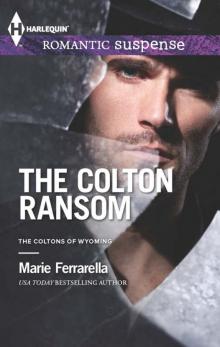 The Colton Ransom
The Colton Ransom Mendoza's Secret Fortune
Mendoza's Secret Fortune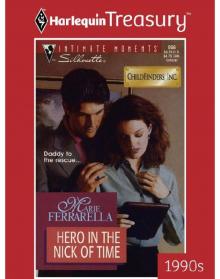 Hero in the Nick of Time
Hero in the Nick of Time![[Kate's Boys 03] - Mistletoe and Miracles Read online](http://i1.bookreadfree.com/i1/04/02/kates_boys_03_-_mistletoe_and_miracles_preview.jpg) [Kate's Boys 03] - Mistletoe and Miracles
[Kate's Boys 03] - Mistletoe and Miracles The Man Who Would Be Daddy
The Man Who Would Be Daddy Fortune's Second-Chance Cowboy
Fortune's Second-Chance Cowboy Coming Home for Christmas
Coming Home for Christmas Her Special Charm
Her Special Charm The Baby Wore a Badge
The Baby Wore a Badge Perfect Wyoming Complete Collection: Special Agent's Perfect Cover ; Rancher's Perfect Baby Rescue ; A Daughter's Perfect Secret ; Lawman's Perfect Surrender ; The Perfect Outsider ; Mercenary's Perfect Mission
Perfect Wyoming Complete Collection: Special Agent's Perfect Cover ; Rancher's Perfect Baby Rescue ; A Daughter's Perfect Secret ; Lawman's Perfect Surrender ; The Perfect Outsider ; Mercenary's Perfect Mission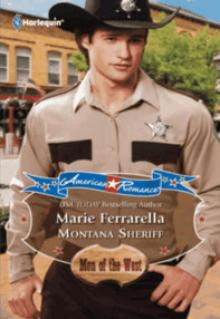 Montana Sheriff
Montana Sheriff Fiona And The Sexy Stranger
Fiona And The Sexy Stranger Military Man
Military Man Dating for Two (Matchmaking Mamas)
Dating for Two (Matchmaking Mamas) Cavanaugh Encounter
Cavanaugh Encounter In His Protective Custody
In His Protective Custody A Small Town Thanksgiving
A Small Town Thanksgiving Wanted: Husband, Will Train
Wanted: Husband, Will Train Suddenly...Marriage!
Suddenly...Marriage! Plain Jane and the Playboy
Plain Jane and the Playboy Private Justice
Private Justice The Strong Silent Type
The Strong Silent Type Christmas Cowboy Duet
Christmas Cowboy Duet Flash and Fire
Flash and Fire Colton by Marriage
Colton by Marriage Fortune's Valentine Bride
Fortune's Valentine Bride Mr. Hall Takes a Bride
Mr. Hall Takes a Bride Her Good Fortune
Her Good Fortune The Disenchanted Duke
The Disenchanted Duke Beauty and the Baby
Beauty and the Baby Cavanaugh Vanguard
Cavanaugh Vanguard In Bed with the Badge
In Bed with the Badge My Phony Valentine
My Phony Valentine The Rancher and the Baby
The Rancher and the Baby Immovable Objects
Immovable Objects Cavanaugh Reunion
Cavanaugh Reunion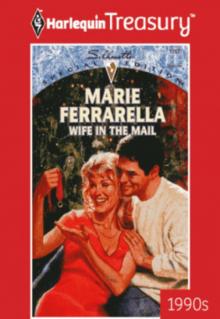 Wife in the Mail
Wife in the Mail A Hero in Her Eyes
A Hero in Her Eyes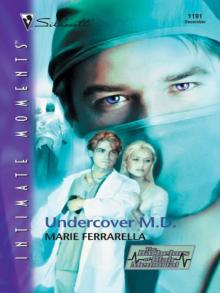 Undercover M.D.
Undercover M.D. Colton Undercover
Colton Undercover Found: His Perfect Wife
Found: His Perfect Wife Dr. Forget-Me-Not (Matchmaking Mamas)
Dr. Forget-Me-Not (Matchmaking Mamas) Loving the Right Brother
Loving the Right Brother Holiday in a Stetson: The Sheriff Who Found ChristmasA Rancho Diablo Christmas
Holiday in a Stetson: The Sheriff Who Found ChristmasA Rancho Diablo Christmas Colton Baby Rescue
Colton Baby Rescue Baby's First Christmas
Baby's First Christmas LASSOED BY FORTUNE
LASSOED BY FORTUNE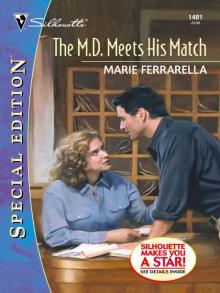 The M.D. Meets His Match
The M.D. Meets His Match A Baby for Christmas
A Baby for Christmas His Forever Valentine
His Forever Valentine The Inheritance
The Inheritance The Woman Who Wasn't There
The Woman Who Wasn't There![[Kate's Boys 05] - A Lawman for Christmas Read online](http://i1.bookreadfree.com/i2/04/09/kates_boys_05_-_a_lawman_for_christmas_preview.jpg) [Kate's Boys 05] - A Lawman for Christmas
[Kate's Boys 05] - A Lawman for Christmas Husbands and Other Strangers
Husbands and Other Strangers A Match for Morgan
A Match for Morgan The Doctor's Guardian & Tempted By His Target
The Doctor's Guardian & Tempted By His Target The Offer She Couldn't Refuse
The Offer She Couldn't Refuse The 7 Lb., 2 Oz. Valentine
The 7 Lb., 2 Oz. Valentine Fixed Up with Mr. Right?
Fixed Up with Mr. Right? Husband: Some Assembly Required
Husband: Some Assembly Required Adding Up to Family
Adding Up to Family Cavanaugh or Death
Cavanaugh or Death Unwrapping the Playboy
Unwrapping the Playboy Becoming a Cavanaugh
Becoming a Cavanaugh Racing Against Time
Racing Against Time Christmastime Courtship
Christmastime Courtship A Billionaire and a Baby
A Billionaire and a Baby Ten Years Later...
Ten Years Later...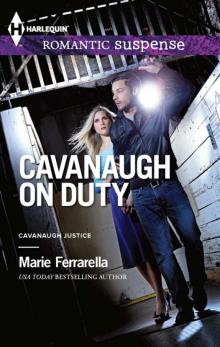 Cavanaugh on Duty
Cavanaugh on Duty Cavanaugh Hero
Cavanaugh Hero Finding Happily-Ever-After
Finding Happily-Ever-After The Prodigal M.D. Returns
The Prodigal M.D. Returns Mendoza's Secret Fortune (The Fortunes of Texas: Cowboy Country)
Mendoza's Secret Fortune (The Fortunes of Texas: Cowboy Country) Once Upon a Matchmaker
Once Upon a Matchmaker Diamond in the Ruff (Matchmaking Mamas Book 13)
Diamond in the Ruff (Matchmaking Mamas Book 13) Fortune's Just Desserts
Fortune's Just Desserts![[Kate's Boys 02] - The Bride With No Name Read online](http://i1.bookreadfree.com/i2/04/10/kates_boys_02_-_the_bride_with_no_name_preview.jpg) [Kate's Boys 02] - The Bride With No Name
[Kate's Boys 02] - The Bride With No Name The Agent's Secret Baby
The Agent's Secret Baby Doctoring the Single Dad
Doctoring the Single Dad Stand-In Mom
Stand-In Mom Diamonds and Deceptions
Diamonds and Deceptions The Bride Wore Blue Jeans
The Bride Wore Blue Jeans The Amnesiac Bride
The Amnesiac Bride Cavanaugh's Bodyguard
Cavanaugh's Bodyguard Brooding Angel
Brooding Angel The Once and Future Father
The Once and Future Father Cavanaugh in the Rough
Cavanaugh in the Rough Mother in Training
Mother in Training She’s Having a Baby
She’s Having a Baby Never Too Late For Love
Never Too Late For Love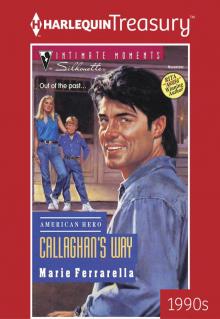 Callaghan's Way
Callaghan's Way Happy New Year--Baby!
Happy New Year--Baby! Diagnosis: Danger
Diagnosis: Danger Your Baby Or Mine?
Your Baby Or Mine? The Maverick's Return
The Maverick's Return Do You Take This Child?
Do You Take This Child? The Women in Joe Sullivan's Life
The Women in Joe Sullivan's Life The Second Time Around
The Second Time Around A Hero for All Seasons
A Hero for All Seasons